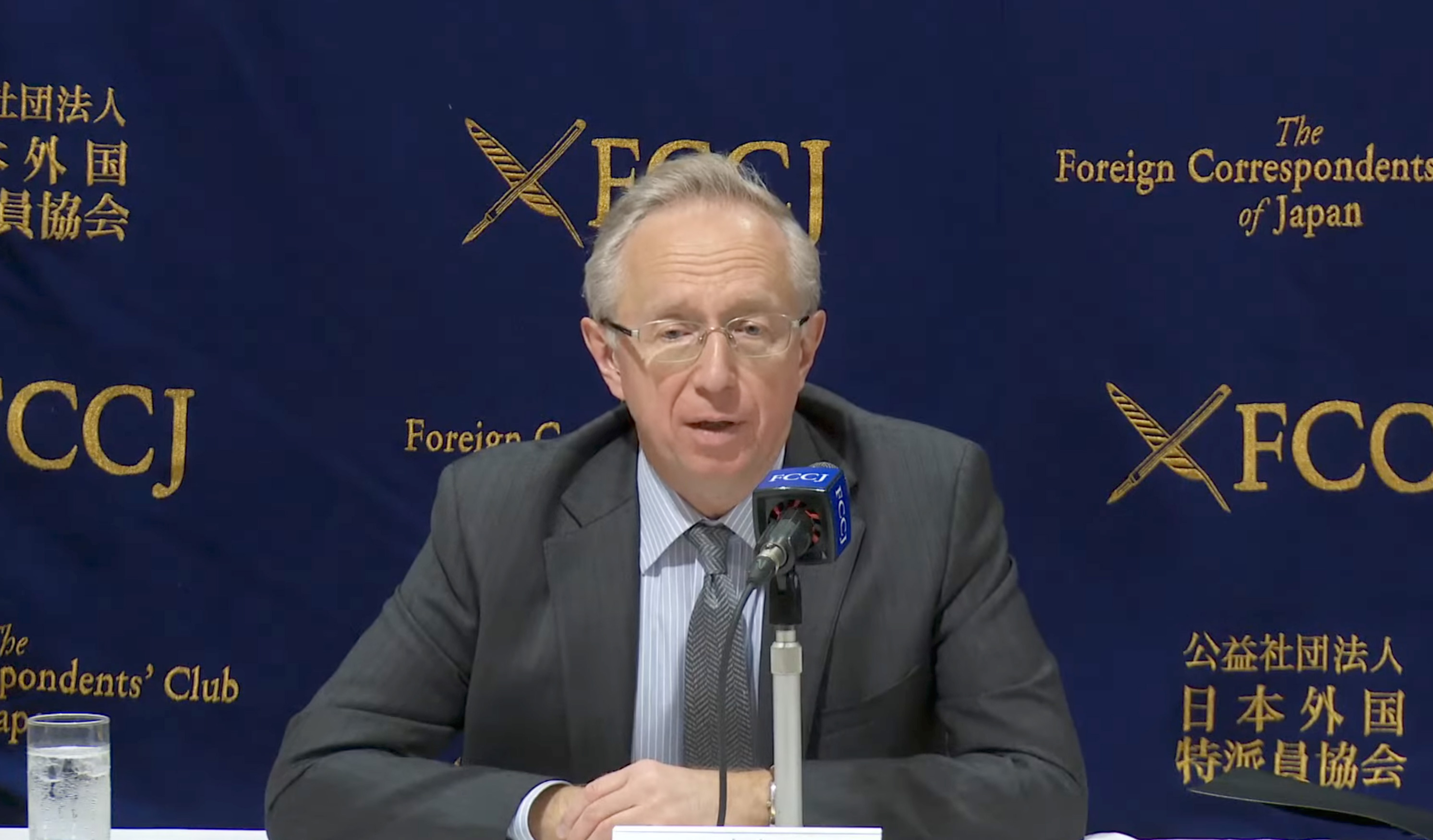Issue:
December 2022
Outgoing Russian envoy hits back at critics during heated FCCJ appearance

As an estimated 100,000 Russian troops flanked the border with Ukraine in early February, Moscow’s ambassador to Japan used a news conference at the FCCJ to dismiss claims that his country would invade its neighbor as a rumor fabricated by NATO.
“No Russian official, in no way, has threatened an incursion into Ukraine,” a bullish Mikhail Galuzin said. “The rumors about this alleged incursion into Ukraine were born on the Western side.”
Just a few weeks later, on February 24, the invasion began when Russian President Vladimir Putin announced a “special military operation” aimed at the “demilitarisation” and “denazification” of Ukraine.
The following day saw an unprecedented blitz of diplomatic action at the club, with Galuzin appearing again, sandwiched between Ukrainian envoy Sergiy Korsunsky and U.S. ambassador Rahm Emanuel.
Galuzin, as any senior diplomat would, echoed his leader’s words, adding that Russia had no plans to occupy Ukraine.
With Japan having slapped additional economic sanctions on Russia, Galuzin said: “I recently have clearly told the Japanese government that these actions from the Japanese side will be responded to and there will be a response from us, I suppose a serious response."
Nine months on, and there is no end to the war in sight. Ukraine has retaken the key city of Kherson but Russia continues to bombard Kyiv and energy infrastructure, putting strain on the power grid as winter temperatures drop below freezing.
Galuzin returned on November 11 for what would be his final appearance at the club before returning to Moscow to assume the role of deputy foreign minister. The fluent Japanese speaker started his diplomatic career in 1983 during the days of the former Soviet Union, going on to serve four times in Japan and as ambassador from 2018.
But a bombshell dropped on the morning before his final news conference, with the publication of a statement signed by 42, mostly Western, envoys to Japan, titled FCCJ is a Spin-Free Zone - The Veracity of the Russian Ambassador’s Words Matter.
“The international community remains united in its condemnation of Russia’s unprovoked and illegal war on Ukraine,” the ambassadors wrote. “Putin’s mouthpieces – whether they are serving as Moscow’s ambassador to Japan or in any other capacity around the world – must not be allowed to spread their falsehoods any longer.”
The statement called on Galuzin to give “honest and factually accurate” answers at the press conference, and deal with five issues concerning the war. In a hat-tip to the club, it said: “Unlike how the Kremlin treats the Russian public, deception and disinformation are not accepted at the FCCJ.”
Galuzin told reporters that he only heard about the statement on arrival at the club and hadn’t had a chance to read past the headline. In a piece of classic whataboutism, he proceeded to turn the tables on the West.
“I said that we will not occupy Ukraine because it is the United States who occupies a part of Syria. It was the United States that was occupying Iraq for many years, and without any legal grounds to do so,” he said. “If anybody occupies Ukraine now, it is the United States and NATO.
“What we are doing in Ukraine, it's not an occupation. First of all, this is our response using our right to self defense which is clearly stipulated in the UN Charter. It is our response to the hostile policy of the NATO countries headed by the United States that encouraged the criminal policy of the Kyiv regime.”
This reporter pointed out the tens of thousands of deaths on both sides and the economic fallout from the war. When I asked when Putin would stop this madness, Galuzin turned on me.
“Well, it seems to me that it will take time to lecture you personally,” he said, his eyes trained on me. “You, and this is very much common for many journalists, unfortunately, in the West, you are artificially making the starting point the 24th of February this year. It’s not true.”
He continued: “The bloodshed and destruction of the Ukrainian population started in February of the year 2014, when the United States and other NATO countries sponsored, masterminded and supported an armed coup d’etat which ousted the legal leadership, lawful leadership of that time in Ukraine, and put into power the Nazi forces that started a genocide policy towards those in Ukraine who did not accept this illegal regime change in Kyiv.
“The bloodshed started at that time. And the madness started at that time.”
Andy Sharp is politics and economics news editor at Nikkei Asia.

